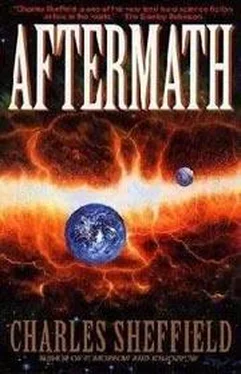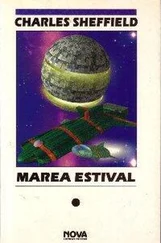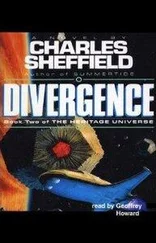“Fifty years,” Saul prompted.
“I’m getting there. Everything that hit us so far was traveling at the speed of light. Gamma rays, visible light, neutrinos. But that’s only a small fraction of the energy that a supernova releases. A lot more energy comes out as high-energy particles. And a particle can’t travel as fast as light.”
“Why not?”
“Well, I’m talking about a particle with mass. A zero mass particle, like a neutrino, travels at the same speed as light. In fact, it has to. But when an ordinary particle is accelerated to a high velocity, up close to light speed, relativity takes over. The amount of energy that you need to accelerate a particle relativistically becomes—”
“Dr. Oldfield, I hate to interrupt. Blame it on a defective education, but when two particular words appear in a briefing, I know that from that point on I’m not going to understand a thing. One of them is relativity. The other is entropy. I concede it, a particle can’t travel as fast as light. What then?”
“Well, it travels slower than light. In the case of particles blown out of a supernova, the actual speed falls into a range. The peak of the velocity distribution, as I calculate it, falls right about eight and a half percent of light speed. Which gives the result that I mentioned.”
He paused, gave the top of his head a last rub, and sat back.
“Finish it, Wilmer,” Celine said grimly. “I’ve told you a hundred times. Dot the i ’s and cross the t ’s.”
“What? Oh.” Wilmer turned back to Saul. “The Alpha Centauri system is one and a third parsecs away from Earth. That’s four point thirty-four light-years. So a particle that travels at eight and a half percent of light speed will take a little more than fifty-one years to get here. There’s slop in the calculation, so half a century is about as good an estimate as you can get.”
“Do you know what the effects will be, when the particles hit us?”
“No. I don’t think anybody does. But I’ll put it in energy terms. Earth — and the whole solar system — will be hit with at least ten times as much energy as we received from the visible and gamma radiation.”
“ ’In the long run, we are all dead.’ That takes on a new meaning. Could it wipe out life on Earth?”
“Oh, I very much doubt that. Single-celled and oceanic forms will presumably survive. But it might make life impossible for humans.”
“Actually, that tends to be my primary concern. Sponges and oysters will have to look after them-
selves.” Saul turned to Grace Mackay. “See if you can find Dr. Vronsky, would you, and ask him to join us. And, Yasmin, tell the people waiting for me that I have to cancel.”
“They include the French Ambassador, sir. You know what he’s like. He will not be pleased.”
“Life is tough all over. Give him a bottle of California wine, that should silence him one way or another. Dr. Oldfield, you paint a bleak picture. Is there anything at all that can be done to prepare ourselves for what’s coming?”
“Many things. And fortunately, we have plenty of time. If you are interested only in human survival, dirt and rock provide excellent protection. It’s not much of an answer, but we could follow Pearl Lazenby’s example and move underground.”
“Triumph of the Mole People. ’Then will I headlong run into the earth.’ I don’t like that answer at all, it didn’t work for Faust. What else?”
“I don’t like it, either. The best solution is to stop the particle storm from hitting us.”
“How would you propose to do that? Move the Earth?”
“No. Build a shield. Out in space.”
“Wait a minute, Wilmer.” Celine could see he was getting fired up, and the President’s eyes were popping. Another man, a heavily built stranger with prominent brow ridges, had entered the room with General Mackay, but it was not the time to stop for introductions. She went on, “You never talked about this to any of us.".
“That’s because nobody ever asked me what we might be able to do.” Wilmer turned again to Saul. “It sounds impossible at first, because the shield would have to be so big — about ten thousand miles across, and placed right between Earth and Alpha Centauri. But it’s not nearly as bad as it sounds. You wouldn’t make a solid shield. The good thing about the particles on their way here is that almost all of them are ionized — they carry charges. So you can divert them with an electromagnetic field. The shield I’m talking about can be a mesh of superconducting wires, thin as gossamer but carrying currents. Shape it correctly, and the rain of particles slide right around the lines of force. They don’t hit the shield, and they don’t hit the Earth.”
The man by the door said, “What about momentum transfer?”
Wilmer nodded. “A valid question. I don’t know the answer, but maybe we could balance it against gravitational forces.”
“I think the forces would sum rather than cancel. Maybe use solar radiation pressure?”
“Dr. Vronsky,” Saul interrupted. “Are you saying that this idea is technically feasible?”
The newcomer frowned. “ Technically feasible? Assuredly. Admittedly, there are a thousand details to be worked out, but. the technical problems are not the difficult ones. Engineering is another matter. A shield of this kind would require a space construction effort many thousands of times greater than has ever before been attempted.”
“And thousands of times more expensive.”
“Assuredly. It would call for global cooperation, and global resources.”
“That’s my department. I’d like you and Dr. Oldfield to begin at once with the ’engineering details.’” Saul stood up. He held out his hand to Wilmer, and then to Celine. “You’ve not had much of a welcome to Washington. If it’s any consolation, no one in my whole life has ever given me as much to think about in so short a meeting. I will feel honored if you can have dinner with me at the White House tomorrow.”
It was a dismissal, no matter how cordial. Somehow Celine was outside the door, with Wilmer at her side.
He said, “I didn’t get the chance to tell him about the other possible ways you could protect from the supernova particle storm.”
“No, you didn’t. And I’ll tell you another thing, you’re not going to talk about them tomorrow night.
How often do you get a chance for dinner with the President?”
“And the other thing, about Supernova Alpha.”
“The fact that it’s impossible, according to current theories? I don’t think you’ll get far with him on that one. You don’t get far with me.”
“You don’t understand. It’s not just close to impossible or marginally impossible. It’s flat-out, throw-away-all-of-physics impossible.”
“So what are you suggesting?”
“That it wasn’t a natural event. That something gave Alpha Centauri a helping hand.”
“Wilmer.” Celine sighed. “Let’s put our problems in a stack. First priority: try and get the world here back to normal. Second priority: worry about what will happen fifty years from now. And you know what? There’s only room in my stack for two problems at a time.”
“If somebody or something could cause a star to go supernova—”
“Not today, sweetheart. Not with me, at least. Try it on Dr. Vronsky.” Celine went to the window. “As for me, I’m going outside there. Want to come with me?”
“Sure. But the President told us — I mean, Dr. Vronsky is probably keen to begin work. I mean—”
“That’s all right.” Celine stretched up to give him a kiss on the cheek. “I was just checking, to see if you were back to normal. You are. You go play games with Dr. Vronsky.”
Читать дальше












